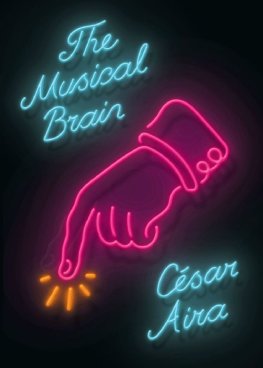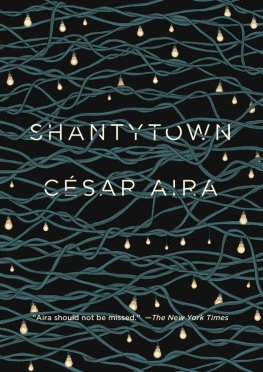Cesar Aira - The Conversations
Here you can read online Cesar Aira - The Conversations full text of the book (entire story) in english for free. Download pdf and epub, get meaning, cover and reviews about this ebook. year: 0, genre: Non-fiction. Description of the work, (preface) as well as reviews are available. Best literature library LitArk.com created for fans of good reading and offers a wide selection of genres:
Romance novel
Science fiction
Adventure
Detective
Science
History
Home and family
Prose
Art
Politics
Computer
Non-fiction
Religion
Business
Children
Humor
Choose a favorite category and find really read worthwhile books. Enjoy immersion in the world of imagination, feel the emotions of the characters or learn something new for yourself, make an fascinating discovery.
- Book:The Conversations
- Author:
- Genre:
- Year:0
- Rating:4 / 5
- Favourites:Add to favourites
- Your mark:
- 80
- 1
- 2
- 3
- 4
- 5
The Conversations: summary, description and annotation
We offer to read an annotation, description, summary or preface (depends on what the author of the book "The Conversations" wrote himself). If you haven't found the necessary information about the book — write in the comments, we will try to find it.
The Conversations — read online for free the complete book (whole text) full work
Below is the text of the book, divided by pages. System saving the place of the last page read, allows you to conveniently read the book "The Conversations" online for free, without having to search again every time where you left off. Put a bookmark, and you can go to the page where you finished reading at any time.
Font size:
Interval:
Bookmark:
I no longer know if I ever fall asleep. If I do, I remain outside of sleep itself, in that constantly moving ring of icy asteroids that circles the dark and immobile hollow of oblivion. It is as if I never enter that shadowy vacuum. I toss and turn, literally, in the zone around it, which is as vast as a world, and actually is the world. I do not lose consciousness. I remain with myself. Thought accompanies me. I dont know if this thought is different from that of full wakefulness; it is, at any rate, very similar.
This is how I spend my nights. To entertain myself, I remember conversations Ive had with friends during the day: each night, those of the same day. Every day these conversations give me material for memory. Since I stopped working, Ive had nothing better to do than get together with my friends and converse for entire afternoons. Ive often wondered if my lack of employment is the reason for my sleep disturbance, because before, when I used to work, I slept normally, like everybody else.
Its quite possible. Deep, restful sleep has always been considered the reward for a productive day. But what choice do I have? I stopped working when my earnings could guarantee me a decent livelihood. Now I have more than enough money to cover my modest necessities, and I have no desire to invent work for myself only to keep busy, as others do. Th at recourse carries life into the terrain of the unreal, and I am a man of realities. Moreover, work accomplished without any genuine need would fail to fulfill the requirement of tiring me out and allowing me to sleep. Th e situation would be more readily comprehensible if I were an old man who had given up all activities because of the natural burden of old age, with its ailments and frailties. When I retired early, I found myself at a halfway point; just like with sleep, I cannot ultimately decide whether I am inside or out.
In any case, I am not complaining. Perhaps I really do sleep. The following morning, it is difficult to make that determination. In any case, through the reconstruction of my daily conversations, I have discovered a nocturnal vein of mental activity that is intensely gratifying. At my age, fears of mental decline set in, so it helps to put oneself to the test, to exercise. And this exercise has reassured me that my memory and my ability to focus are still intact, as is my reason.
I am fortunate: throughout my life, Ive formed a first-rate circle of friends. Though I myself am not, properly speaking, an intellectual, Ive always been interested in and felt affinities for all things cultural; these affinities have translated themselves into close relationships with distinguished personages in the arts, the humanities, and the sciences. They, in turn, have apparently found my company not disagreeable, for the friendships that weve built over time remain strong, and we meet frequently especially now that I am always available.
The level of our conversations is consistently high. There is no place for gossip, soccer, health issues, or food; our exchanges glide along the lines of history and philosophy. Hence, my nocturnal recollections are rich in sustenance that I can sink my teeth into. The topics we discuss lift them above mere mechanical memory and onto the level of reflection and learning.
In bed, I always focus on the conversations of that same day, though I could also turn my attention to those from years or even decades before. It might sound presumptuous to use the grandiloquent word memory for something that occurred no more than a few hours before. But thats fine by me. It is often said that with age, our memory moves further away from the present and that old people are better able to remember what happened in childhood than the day before. I prefer to exercise my memory on what is immediate, closest at hand.
And, truly, my memory is a prodigious apparatus, one that amazes me night after night with its precision and reach. Not only do the topics and the succession of topics return, but so do the responses, one by one, and even the uncertainties, our mutterings when we are not able to find the right word, the digressions we allow ourselves. I would like to make clear that our conversations are neither academic nor planned; they are, rather, exchanges among friends (all highly cultured, for sure) with the endless shifts of direction typical of any conversation. Without much effort, I achieve an exact duplicate, though one that is even richer precisely because it is a duplicate. Memory allows me to go more deeply into ideas that pass by too quickly in the course of reality. I can stop wherever I want and contemplate a thought or its expression, analyze the mechanisms that articulate it, discover a defect in an argument, make a correction, retrace certain steps. I look at these conversations, which have become miniaturizations, through a magnifying glass, and my sleepless contemplations render them as beautiful and flawless as jewels. Their very disorder, redundancies, and lack of purpose are swathed in an artistic iridescent sheen because of and thanks to repetition.
Take, for example, my reconstruction last night of the conversation I had yesterday afternoon with one of my friends. We met, as he and I always do, in a caf downtown, and while drinking our coffee, we began our dialogue by casually exchanging comments about a movie that had been shown on television the evening before and that we both had happened to see. It was a conventional movie, mere entertainment laced with a few pretensions that did not fool us in the least. My friend and I share the unobjectionable habit of watching banal shows on television at night in order to relax. We also share a distaste for those so-called cultural programs that are shown so widely on cable channels. Th e fact is, the situation of a man of culture is symmetrically inverse to that of the common citizen, who after a day of prosaic and practical activities turns on the television set in search of some spiritual elevation. On the contrary, for those of us who have spent our day in the company of Hegel or Dostoyevsky, such cultural programs are a waste of time, and for this same reason, as well as their intrinsic worthlessness, we find them paltry and narrow-minded, if not downright ridiculous.
Wed both seen only fragments of this movie; due to tedium and channel surfing as well as domestic distractions, wed seen different parts, one of us more at the beginning and the other more at the end. But that was enough; stereotypical Hollywood productions of this kind can be fully deduced from one or two scenes, the same way paleontologists can reconstruct an entire dinosaur out of a single vertebra. If one keeps watching, it is only to confirm what one already knows, a confirmation that, difficult as this may be to admit, brings its own satisfaction.
So, we understood each others comments. Something so trivial, of course, did not call for much commentary on our part, and none would have been made had I not mentioned, with a smile, a fairly gross error that the producers had made. It was as follows: the protagonist, a humble goatherd in the Ukraine... was wearing a Rolex watch! I burst out laughing when I said it, and when remembering it in bed, a smile surely spread across my face. In the act of doing both things laughing in reality and smiling upon remembering it I realized that the blank expression on my friends face was of someone who doesnt understand what he is hearing. Here it is appropriate to add an aside: a memory can be identical to what is being remembered; at the same time, it is different, without ceasing to be the same. My friends look of incomprehension, which I saw while sitting across from him at the small table in the caf, was precisely that: a request for an explanation that was still unaware that it was requesting one. In my memory, on the other hand, his look was laden with everything that happened subsequently. By virtue of remembering, everything took place at the same time, even though the temporal sequence had been maintained.
Next pageFont size:
Interval:
Bookmark:
Similar books «The Conversations»
Look at similar books to The Conversations. We have selected literature similar in name and meaning in the hope of providing readers with more options to find new, interesting, not yet read works.
Discussion, reviews of the book The Conversations and just readers' own opinions. Leave your comments, write what you think about the work, its meaning or the main characters. Specify what exactly you liked and what you didn't like, and why you think so.














